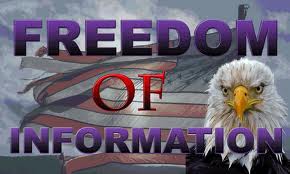Freedom of Information Act « Legal Matters

Freedom of Information Act (FOIA)
- Freedom of Information Act (FCC)
The Freedom of Information Act, commonly known as the FOIA, was enacted by Congress in 1966 to give the American public greater access to the Federal Government's records. The Electronic Freedom of Information Act Amendments of 1996 expanded the scope of the FOIA to encompass electronic records and require the creation of "electronic reading rooms" to make records more easily and widely available to the public. Most recently in December 2005, Executive Order 13392, "Improving Agency Disclosure of Information," reaffirmed that FOIA "has provided an important means through which the public can obtain information regarding the activities of Federal agencies" and required Federal agencies to make their FOIA programs "citizen-centered and results-oriented." - National Security Archive
The U.S. Freedom of Information Act (FOIA) is a law ensuring public access to U.S. government records. FOIA carries a presumption of disclosure; the burden is on the government – not the public – to substantiate why information may not be released. Upon written request, agencies of the United States government are required to disclose those records, unless they can be lawfully withheld from disclosure under one of nine specific exemptions in the FOIA. This right of access is ultimately enforceable in federal court. - The Freedom of Information Act (Justice.gov)
5 U.S.C. § 552, As Amended By Public Law No. 104-231, 110 Stat. 3048
The full text of the Freedom of Information Act in a form showing all amendments to the statute made by the "Electronic Freedom of Information Act of 1996."
Articles and Information on FOIA
- Let the Sunshine In: How Public are our Public Records?
A report on Wayne State University students' requests for public records and the resulting compliance. - Michigan's Freedom of Information Act (FOIA) (Office of Attorney General – July 2007)
The FOIA regulates and sets requirements for the disclosure of public records by all public bodies in the state. This is a summary of the basic provisions of the Act, including the actual text of the statute. - State Public Record Laws (FOIA Advocates)
All 50 states also have public records laws which allow the public to obtain documents and other public records from state and local government bodies. State public records laws are not identical to FOIA nor are state court interpretations of similar language in state statutes necessarily the same as federal court interpretation of FOIA (though many were modeled upon the federal FOIA). Search for your state's public records laws here.
